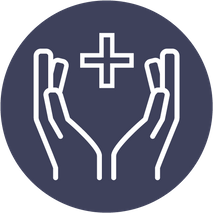
Physical Therapy for Tendonitis
AT EVOLVE
Physical Therapy for Tendonitis
HOW CAN PHYSICAL THERAPY HELP MANAGE SYMPTOMS OF TENDONITIS?
Tendonitis is a condition involving inflammation or irritation of the tendon that connects a muscle to a bone. It can occur in any tendon and often results when a tendon is overloaded beyond its capacity to withstand repetitive or chronic stress. Pain over the tendon or when contracting the involved muscle, stiffness in the area and even feelings of muscle weakness can indicate tendonitis. While your initial instinct may be to rest the painful area until symptoms subside, a physical therapist can show you a more proactive approach that will heal the injured tendon, help you return to activities without pain and prevent the recurrence of tendonitis in the future.
WHAT DOES PHYSICAL THERAPY FOR TENDONITIS LOOK LIKE?
Physical therapy for tendonitis is two-pronged. First, we aim to reduce symptoms of pain and discomfort and restore full flexibility and strength. Second, we look to address any underlying factors in order to reduce the likelihood of symptom recurrence. My team of therapists and I will start by getting to know your concerns and goals and performing a thorough physical exam to determine what areas we should target with our physical therapy interventions. Your therapist may employ manual therapy interventions to target joint and tissue mobility while also prescribing movements and exercises for strength, motor control and mobility to be performed in the home and the clinic.
WHEN WILL I BEGIN TO SEE RESULTS?
The duration of your physical therapy plan of care is based on many different factors including the severity of your symptoms and the number and type of underlying factors your therapy is looking to address. While full resolution of symptoms can take time, you may begin to see some results right away. You should experience improvements in many symptoms such as pain, stiffness, and inflammation within a couple of weeks but making meaningful changes in strength, flexibility and overall mobility in order to provide long-term relief may take longer. Achieving long lasting results may take some time, but dedication to your program will not only help you achieve these results but will help to decrease the likelihood of symptoms recurring in the future.
WHAT IS OCCURING DURING TENDONITIS?
Tendons are sheets of fibrous connective tissue that anchor muscles to bone. Muscles contract to move or stabilize bones but tendons help to provide tensile strength and amplify the effect of muscle contractions. Like muscles, tendons can weaken or strengthen/stiffen depending on the stimulus they are receiving. This process can make tendons more prone to or resilient against injury. Tendons are built to withstand a lot of force but repetitive stress which exceeds the tolerance of the tendon can lead to injury. The overloading of the tendon may be caused by ramping up the volume of a new activity too quickly, or due to muscle strength or length impairments, movement pattern inefficiencies and biomechanical errors in and around the involved tendon.
Initially, the symptoms of pain and soreness may be caused by localized inflammation–known as tendonitis ( “itis” = inflammation ). In this case anti-inflammatory medications and other treatments aimed at reducing inflammation are often effective as long as the tendon is allowed to rest.
Oftentimes, however, ongoing symptoms are not caused by persisting inflammation which is why anti-inflammatory medications and ice, for example, may lose effectiveness over time. In this case the tendon is likely not inflamed but has undergone some degeneration leading to chronic symptoms. This is called tendinopathy and likely accounts for ongoing symptoms in many chronic tendon injuries. Why does this matter? This matters because while rest may be helpful for an inflamed tendon, it is not the best treatment for tendinopathy. In fact, it may have the opposite effect.
While tendon injury can technically occur in any tendon, symptoms of tendonitis or tendinopathy usually present similarly no matter where the irritation occurs. Symptoms of tendonitis include:
- Pain over the involved tendon when the muscle is contracted
- Pain over the involved tendon when the muscle/tendon is stretched
- Swelling or inflammation over the injured tendon
- Stiffness when moving the joint near the involved tendon
- A feeling of weakness when contracting the involved muscle
WHAT ARE SOME COMMON TYPES OF TENDONITIS?
As mentioned before, tendonitis can technically occur in any tendon of the body but the following is a list of some of the more common types of tendonitis treated by physical therapists:
- Patellar tendonitis (aka jumper’s knee)
- Rotator cuff tendonitis
- Lateral epicondylitis (aka tennis elbow)
- Medial epicondylitis (aka golfer’s elbow)
- Achilles tendonitis
- Thumb tendonitis (aka De Quervain's tenosynovitis)
- Hip flexor tendonitis
- Posterior tibialis tendonitis
- Hamstring tendonitis
End Injury Progression
Physical therapy for tendonitis has proven to slow and even stop pain, related issues, and injury progression in many cases.
Relieve Pain
The movements used in this technique can target your lower back, upper back, hips, shoulders, and neck helping you to manage pain during the course of your physical therapy treatments.
Improve Range of Motion
Posture awareness is an important area to focus on due to the fact that certain positions may cause you further back pain.
Restore Mobility
You can gain mobility and flexibility by taking part in the stretches and exercises as prescribed by your physical therapist.
How Long Will Tendonitis Physical Therapy Treatments Last?
If you decide to work with a physical therapist to help correct your tendonitis issues, your entire treatment plan could consist of around 8-20+ different physical therapy for tendonitis sessions that will each last 60-90 minutes. Once you complete your customized tendonitis physical therapy treatment plan, you will be able to continue to do the prescribed stretches and exercises utilized during your tendonitis PT sessions yet in the comfort of your own home.
PHYSICAL THERAPY TO ADDRESS TENDONITIS
As mentioned above, physical therapy to address tendonitis is a two-pronged approach. Providing symptom relief is a primary goal of physical therapy for this condition but in order to minimize the likelihood of recurrent bouts of tendonitis, tendinopathy or a more severe tendon injury, addressing tendon stiffness plus identifying underlying contributing factors and making a plan to address them is vital.
If inflammation is present around the tendon in the early stages of injury your physical therapist may utilize modalities like ultrasound, electrical stimulation or ice to address inflammation and pain. As mentioned, however, in chronic cases, inflammation is often not the culprit of your symptoms and a more active approach to tendon recovery is indicated.
In the case of tendinopathy there will be more emphasis on interventions that will help remodel the structure of the tendon. The goal of treatment for tendinopathy is to apply graded stress to the tendon and increase its stiffness so that it becomes more resilient to the repetitive forces of your work tasks and favorite sports. To do this correctly, your PT will guide you on appropriate dosing of specific exercises and may also utilize tools such as ASTYM or Graston to encourage collagen production and remodeling. Finally, addressing other contributing factors such as impairments in strength, flexibility, coordination and motor control in adjacent muscles and joints can help ensure excessive stress is not placed on the tendon as you return to your previous activities. All of these things together will help you resume your previous activities with greater confidence, resilience and a knowledge of how to manage this condition in the future.
If you are dealing with a tendonitis and are ready to find a long-lasting solution to your pain call us today to learn more about our services and schedule an evaluation
Mill Basin (located in Harbor Fitness)
6161 Strickland Ave
Brooklyn, NY 11234
Monday: 7am-8pm
Tuesday: 7am-8pm
Wednesday: 8am-5pm
Thursday: 7am-8pm
Friday: 8am-1pm
Park Slope (located in Harbor Fitness)
550 5th Ave.
Brooklyn, NY 11215
Monday: 9am-8pm
Tuesday: 8am-6pm
Wednesday: 9am-8pm
Thursday: 8am-6pm
Friday: 8am-3pm
Gravesend
372 Avenue U
Brooklyn, NY 11223
Monday-Thursday: 8am-8pm
Friday: 8am-3pm
Ready to take the next step to a healthier you?
Contact Us Today!
PHYSICAL THERAPY FOR TENDONITIS AT EVOLVE!
Need Physical Therapy for Tendonitis?
Let our caring and compassionate physical therapists help you with relieving pain while getting you back on your feet comfortably.
Call now to schedule your first PT consultation free of charge.
Call: 1-718-258-3300






